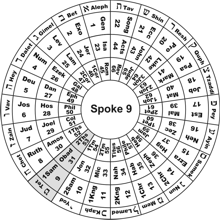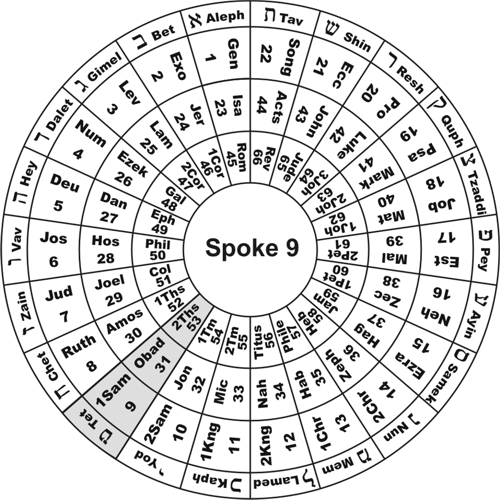1 Samuel: Death to the Flesh!
Shall I not in that day, saith the LORD, even destroy the wise men out of Edom,
and understanding out of the mount of Esau? And thy mighty men, O Teman, shall be dismayed, to the
end that every one of the mount of Esau may be cut off by slaughter. For thy violence against thy brother Jacob shame
shall cover thee, and thou shalt be cut off for ever. In the day that thou stood on the other side,
in the day that the strangers carried away captive his forces, and foreigners entered into his gates,
and cast lots upon Jerusalem, even thou wast as one of them.
Obadiah 8ff (Spoke 9, Cycle 2)
Obadiah is the first Book of the Bible that contains no mention of the
Tet KeyWord tov (good).
This is a variation of the Principle of
First Occurrence by which emphasis is achieved through carefully designed absence.
For example, God used this principle with great effect in
Esther which is the first Book where He Himself is not mentioned (BW book pg 307)
and in John which is the only Gospel that fails to mention the Shin KeyWord shemesh
(sun, BW book page 356). As we shall see,
the absence of tov in Obadiah is an illustration of the Gospel message
"For I know that in me (that is, in my flesh) dwelleth no
good thing" (Rom 7:18). God engraved this doctrine in the unified alphabetic and geometric structure of His Word.
Obadiah is the smallest Book in the Old Testament. The essential theme of its twenty-one verses
is the destruction of the people of Edom, the perpetual enemies of God's chosen people, Israel. The late Ray Stedman
explained the situation very well in his magnificent overview of all Sixty-Six Books,
Adventuring through the Bible  : :
The book of Obadiah tells the story of two nations, the nation of Israel and the nation of Edom,
the country to the south of Israel that is now usually referred to as the Negev or Negeb. Through
this ancient land of Edom the Israelites marched as they came into the land of Israel out of the captivity and slavery of Egypt.
As they came into the land they had difficulty with the Edomites; they were enemies of Israel from its very beginning. But
behind the story of these two nations, this book tells the story of two men. Every nation in the Bible is a lengthened shadow
of its founder, and the two men behind the nations Israel an Edom were twin brothers. Do you know who they are?
Jacob and Esau. Jacob was the father of Israel, and Esau, his twin brother, became the father of the Edomites. In the
story of these nations you also have the extended story of these two men, Jacob and Esau.
It was Edom's enmity with Israel that God spoke against in Obadiah, "For thy violence against thy brother Jacob ...
thou shalt be cut off for ever." The hatred was ancient and unending. It began in Genesis when Esau lost both his birthright and
his blessing to Jacob (Israel). Stedman explained the ensuing warfare in his notes on Obadiah:
The judgment of God is absolutely inescapable for Esau. God is forever set against him. One of the grandsons
of Esau was a man named Amalek, who withstood the Israelites on their way into Canaan. In Exodus 17:14-16 it is
recorded that God said to Moses, "I will utterly blot out the remembrance of Amalek from under heaven." And Moses says,
"The Lord will have war with Amalek from generation to generation." That is what God is saying about the flesh.
He will never make peace with it.
This links us back to Cycle 1 of Spoke 9. Amalek's attack on the fledging nation of Israel was the reason God commanded Saul to
utterly destroy them:
Thus saith the LORD of hosts, I remember that which Amalek did to Israel, how he
laid wait for him in the way, when he came up from Egypt. Now go and smite Amalek, and utterly destroy all
that they have, and spare them not; but slay both man and woman, infant and suckling, ox and sheep, camel and ass.
1 Samuel 15:2f (Spoke 9, Cycle 1)
Saul disobeyed this command, choosing to keep the best (tov) of the spoil
(BW book pg 225). This led to his downfall. The supernatural unity of the first
two Books on Spoke 9 is now evident. Of all sixty-six titles Stedman chose for his reviews of the Books of the Bible,
two and only two use the word "death" – the titles of 1 Samuel and Obadiah (verify  ).
Here are samples of his comments on these
two Books from Spoke 9. Note that he used many identical phrases: ).
Here are samples of his comments on these
two Books from Spoke 9. Note that he used many identical phrases:
This is the Divine Unity of the Holy Bible. The great unifying theological patterns that dominate each Spoke
have been seen, understood, and fully documented by countless Biblical scholars over the span of centuries. Praise the Lord now and forever!
| 


